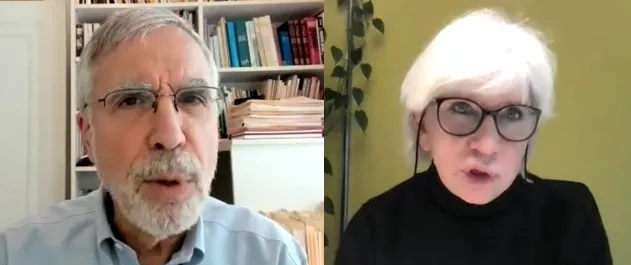
Near term action to combat climate change is critical if the world is going to slow the pace of global warming to a significant degree. That was the perspective voiced on Tuesday (November 30) by Laurence Tubiana, Director General of the European Climate Foundation during a Virtual Forum hosted by the Harvard Project on Climate Agreements (HPCA) and moderated by Robert Stavins, HPCA Director and A.J. Meyer Professor of Energy and Economic Development.
Tubiana, who served as France’s Climate Change Ambassador during the 21st UN Framework Convention on Climate Change (UNFCCC) Conference of the Parties (COP21), when the historic Paris Agreement was signed, admitted that while the recent COP26 event in Glasgow, Scotland did not produce any breakthrough pacts, it was a step forward in the right direction.
“We are making slow progress…130 countries have committed to a target net-zero [emissions] by 2050 or soon after,” she stated. “Very few, almost none, are backed or substantiated by any kind of precise pathway to get there, so that is why short-term action is more important than ever.”
One positive development from Glasgow, Tubiana reported, was a commitment by the signatories to the Paris Agreement to update their Nationally Determined Contributions (NDCs) in time for COP27 scheduled for next year in Egypt. The countries also agreed to accelerate “efforts towards the phase-down of unabated coal power and inefficient fossil fuel subsidies” and to try to increase their monetary contributions to developing countries to help them cope with the effects of climate change and make the switch to clean energy.
When asked her thoughts about the prospects for the multilateral development banks to contribute significantly to the climate change fight, Tubiana expressed some doubts.
“The international financial system nowadays is not fit for the problem of the climate challenge we face. We are talking about three to four trillion [dollars] a year in additional investment on the global level for this ecological transition and the international financial system is not responding and maybe cannot respond in this actual form,” she said. “So called ‘green finance’ is around two percent of the global financial markets, so with that we cannot respond [adequately] to the challenge.”
Tubiana lauded the dramatic speech delivered at COP-26 by Barbados Prime Minister Mia Mottley, in which she called upon those nations that have contributed most to global emissions to take immediate responsibility for the climate change challenge and to assist those nations most at risk. She stressed that island nations suffering from extreme weather events every few years do not have the economic capacity to rebuild every time and to pay back the debts they would incur if they tried.
When asked about grassroots youth climate activism, Tubiana remarked that she understands their anxieties as they face a very uncertain future.
“They feel that their demonstration in the streets isn’t working enough. Governments aren’t responding to what they’re asking for,” she said. “We are failing them, and we are failing them not only because we aren’t active enough on climate change, but because we don’t offer them the political pathways to participate and make their voices hear in the political system.”
This webinar series, HPCA Conversations on Climate Change and Energy Policy, features leading authorities on climate change policy, whether from academia, the private sector, NGOs, or government. Look for an announcement about the next Virtual Forum. You will be able to register in advance for the event on the HPCA website
Gavel, Doug. “European Climate Foundation Director General Shares her Perspectives on COP26.” November 30, 2021
